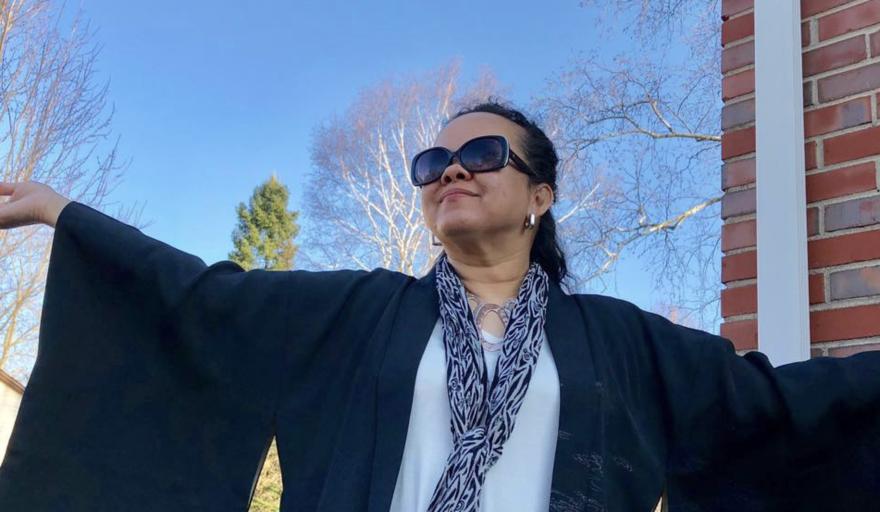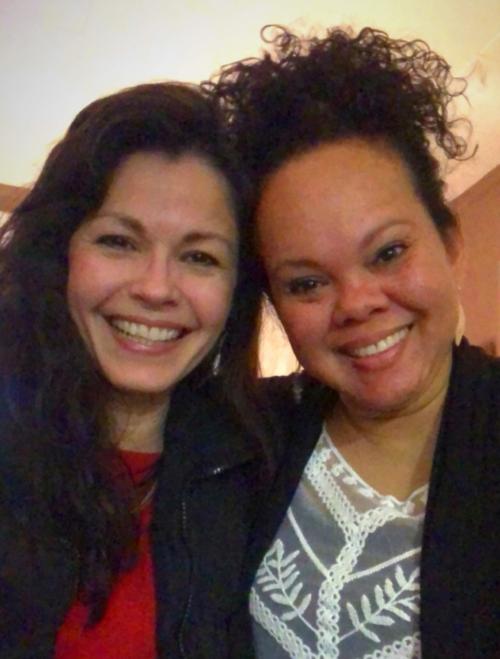In the Right Place
Minh Aimone
MSW '22

Minh Aimone is 52 years old and 8,785 miles from her birthplace in Vietnam. But time and distance are inconsequential when you know you are in the right place—which she says she is, as she completes her work on her MSW. Getting to that place, however, has been far from easy.

In 1981, Minh Aimone’s mother was forced into a decision no mother should be forced to make. Fearing for her two daughters’ lives, Hieu Huynh put Minh, 13 at the time, and Linh, 10, on a boat filled with other Vietnamese citizens and headed to a refugee camp in Thailand.
Vietnam had become a communist state in 1975 and the Huynhs were at greater risk than others, because the two girls were Amerasians. Minh and Linh had separate American servicemen as fathers. They were, in the eyes of the communist government, enemies of the state. Amerasian was a derogatory word in Vietnam used to describe biracial children of American servicemen.
“Many Amerasian children were abandoned or left at the orphanage doorsteps,” says Aimone, who is working on her MSW in the School of Social Work. “Some people would take these children in and treat them well; others would take them in and enslave them.” Many tried to escape Vietnam. “If the three of us were caught fleeing, we could get shot or put in prison and lose our home,” Aimone says. “So, Mom sent us two girls on while she stayed back. She knew we would not survive in Vietnam.”
And so, Minh Aimone’s journey began.
Treacherous Travels
The journey nearly ended shortly after it began. After leaving Ho Chi Minh City (formerly Saigon), the two sisters walked for three days through rice fields and jungles to a port in Vung Tàu, where their mother had secured passage for them on a boat with 139 other people fleeing the country. Their first night on the South China Sea, a storm struck, severely damaging the back of the boat, knocking off the motor, and washing overboard burlap bags and fishnets holding food and water—as well as the captain of the boat, who was trying to salvage the food.
The trip to Thailand was supposed to take three days, but their boat drifted for a week and a half, pelted by additional storms. A vessel pulled up at one point, but it was a pirate ship. The marauders came aboard and stole anything of value from the frightened passengers.
“There we were, no captain, no engine, no food or fresh water,” Aimone says. “We had to drink our own urine to survive. Some parents, not knowing better, were giving their children sea water, which ultimately cost them their lives. We were surrounded by many dead bodies of children.”
By the time they did get rescued, 29 people had died—27 of them children. The 112 survivors were placed in refugee camps in Thailand. While in camps, Aimone and her sister studied under adult supervision to keep up as best they could with their education.
A New Home
Having started their journey in 1981, the two sisters left their final refugee camp in June 1983, flying from Thailand to Hong Kong to Los Angeles to Chicago. They ended up in a home in Peoria for refugee minors, where they stayed for nine months before being taken in by Andrew and Dolores Sofranko of Champaign. Andrew was a professor in the University of Illinois’ College of ACES (Agricultural, Consumer and Environmental Sciences) for 33 years, and Dolores was a social worker for Catholic Social Services, later renamed Catholic Charities.
And so, their new life in Champaign—8,785 miles from Vietnam—began. Minh was placed in Central High School, and Linh started in Columbia Elementary School. Always a lover of education, Minh was on the honor roll her whole time in high school, though it would take her much longer to do her homework than it would the average student. “I had a Merriam-Webster Dictionary and a kid’s dictionary open at all times when I studied,” she says. “I had to translate everything.” She jokes that MTV and soap operas accelerated her language learning.
In 1999, when Aimone was 31 years old, she and her sister were able to sponsor their mother to come live in the US. Minh and Linh helped their mother with the language, transportation, obtaining employment, and other acculturation issues. “That was the beginning of my thinking about helping immigrants,” Aimone says.
Aimone, who works at Gies College of Business as an office support staff, became involved with Amerasians Without Borders, a nonprofit organization that helps Amerasians in Vietnam come to the US, and ships DNA kits to Vietnam in an attempt to help Amerasians connect with their biological fathers. She eventually connected with her biological father in 2018, when she was 50 years old. “I’d given up long ago on finding him,” she says. “It was all in God’s timing. It was meant for me to find him when I was 50.” She visited him in his home in Florida and says she “felt like she was being reborn” when she met him and gave him a hug. “It’s hard to put into words,” she says. “He’s been very kind to me.”
Entry into Social Work
Her volunteer work with Amerasians Without Borders led her to pursue social work. When Aimone attended an information session for the School of Social Work, “It spoke to my heart,” she says. “It said, Minh, that’s what you’re going back to school for.”
She enrolled in the School in the summer of 2019. “I was scared,” she admits. “There was a 30-year gap between me and some of the other students. It had been 28 years since I was an undergrad. I thought, how am I going to do this successfully?”
That thought was compounded when, three weeks into her MSW program, she was in the ER with heart failure. Her doctors were talking about the possibility of a heart transplant.
“But a year later, my heart is almost perfect,” Aimone says. “That’s very rare. I’m very blessed to have another chance at life.”
The School, she says, was extremely supportive of her as she recovered. “It gives me great comfort and the strength to go on knowing I have the support to do this,” she says. “My instructors have been there for me, and they know exactly what to say and when to say it. They’ve given me a deeper meaning, a testimony and illustration, of what it means to be a good social worker.
“It gives me more encouragement, telling me I am in the right place.”
Paying It Forward
Aimone says the blessings in her life have surpassed the hardships she has endured.
“I say thank you to God because I could have perished on that boat along with 27 other children, or been a slave in the jungle somewhere in Thailand, but Linh and I made it here and we raised beautiful families with our kids. We are living the dream: freedom!”
Aimone is grateful not only to God, but to the US and to her foster parents, social workers, teachers, and mentors who have helped and encouraged her along the way. It overwhelms her to try to thank them all.
“The only way to thank them,” she says, “is to live my life with purpose, to pay it forward, to help other people.”
“I’ve been very blessed, and I want that for other people. I want for them to see the good in their journey and make the best of what time they have left on this earth and lead a purposeful life.”
